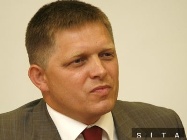Slovak, Hungarian leaders fail to thaw icy relations
 Bratislava - Slovak Prime Minister Robert Fico and his Hungarian counterpart Ferenc Gyurcsany Saturday failed to thaw icy relations between their countries in a meeting called to reduce nationalist tensions.
Bratislava - Slovak Prime Minister Robert Fico and his Hungarian counterpart Ferenc Gyurcsany Saturday failed to thaw icy relations between their countries in a meeting called to reduce nationalist tensions.
The leaders called for cooperation and condemned extremism after their meeting in the southern Slovak border town of Komarno.
However, speaking before reporters, they mostly engaged in a stinging exchange that did more to highlight their disagreements than signal a quick way out of the crisis.
"The biggest problem is the export of fascism and extremism from Hungarian territory to Slovakia," Fico said at a press conference televised on the TA3 news channel.
He urged his counterpart to crack down on Hungary's neo-Nazis, who have contributed to escalating tensions in recent weeks.
"It is unacceptable for us ... that 28 people dressed in Hungarian fascist uniforms cross the border and march through a Slovak town," Fico said referring to a recent incident.
Speaking through an interpreter, Gyurcsany countered that Slovak politics "are not merely flirting with nationalism, but are engaged to it" and urged Fico to fight xenophobes in his own government.
Relations between the two neighbours have deteriorated since the summer of 2006 when Fico formed a three-party government, which includes the Slovak National Party, led by Jan Slota. The controversial Slovak politician has repeatedly attacked Hungary.
While Slota does not have a seat in Fico's cabinet, Fico's move has emboldened right-wing radicals and sparked waves of extremist acts on both sides of the border.
Relations have hit a new low after a string of incidents in both countries in recent weeks.
Slota recently insulted Hungarian Foreign Minister Kinga Goncz, likening her to Adolf Hitler, while Hungarian right-wing extremists have protested over territorial claims in Slovakia, once part of Hungary.
Bratislava accused Budapest of failing to halt the protests in which Hungarian neo-Nazis burnt a Slovak flag in front of its embassy in Budapest.
The leaders remain divided over recent violent clashes between Slovak police and radical Hungarian fans at a football match in southern Slovak town of Dunajska Streda.
In another incident, Slovak police detained 28 Hungarian radicals wearing replicas of fascist uniforms in the south-eastern Slovak town of Kralovsky Chlmec. The Hungarians wanted to celebrate the 70th anniversary of the so-called First Vienna Award, in which Nazi Germany and fascist Italy gave southern Slovak regions to Hungary.
The two countries have also fought over new textbooks for Hungarian children in Slovakia, which feature Slovak names of geographical sites in otherwise Hungarian text.
Symbolically, the meeting took place in Komarno, a bastion of Slovakia's 500,000-strong Hungarian minority. The once-thriving Austrian-Hungarian imperial military town was cut in half following World War I.
Despite a bloody uprising, the heart of the Hungarian-inhabited town ended up in the newly-formed Czechoslovakia. Slovakia and the Czech Republic peacefully split 15 years ago.
Gyurcsany, who has yet to reply to Fico's year-old invitation for a state visit to Slovakia, invited Fico to another working meeting in Budapest early next year. (dpa)